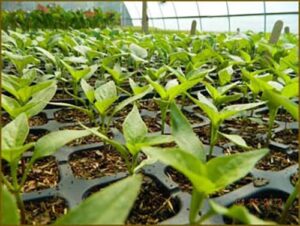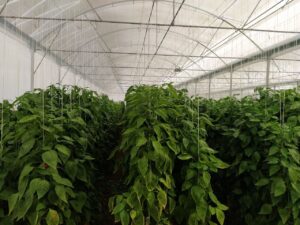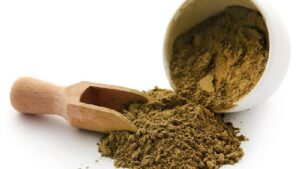Henna is a plant from the dicotyledonous family that makes a specific family called Henna.This plant is a shrub that is native to North Africa, South and West Asia, and North Australia.
Henna has been used as a cosmetic in ancient Egypt, parts of North Africa, west Africa, the horn of Africa, the Arabian Peninsula, the Near East of the Indian subcontinent, and South Asia. Henna colour is used to colour the skin, hair and nails, as well as fabrics such as silk, wool and leather.
Iranians have long known the magical properties of henna in medicine and treatments of skin disease, for this reason, henna had a very special place in the expansion of commercial, agriculture, exports and labour production in Iran.
To grind henna leaves many Mills were built that worked with water; but with the passage of time, when the fields and Henna gardens replaced by the products, all the Mills and commercial industries in connection with the henna industry, gradually disappeared.
There is a substance in henna leaves that not only has colour properties but also has antibacterial and antifungal effects.
Henna is cultivated in many parts of Iran, especially in the south of the country, including balochistan and kerman, and it is of high quality. Henna originally comes from Egypt and this country is the main supplier of henna in the world.
1200 BC in Egypt henna was used to dye hair, skin, nails and embalming. Cleopatra is known to have used henna to maintain hair beauty. In other words, henna is a small and narrow evergreen tree that grows in tropical regions with dry climate. Small henna flowers are fragrant and white.
The henna plant especially in its leaves has medicinal properties. Henna is very mild and has cooling properties. This property gives a skin refreshing feeling when use topically. When the cooling benefits of henna became appeared to people, people living in deserts began using henna to cool their bodies.
Stay with us in the rest of the article to learn more about some of the unique benefits of henna herb.
Benefits of henna
The henna benefits for the health of the body, hair and skin are countless. In many countries including India, North Africa and Muslim countries, this plant is used in traditional medicine.
In this part of the article we are going to get to know the benefits of henna in a more complete way.
-
Henna benefits for headache treatment
Henna flowers can help reduce headaches caused by The heat of the sun. You can use henna herb juice to relieve migraine, headache and scalp pain. The anti-inflammatory and Cooling effects of henna help to reduce tension and stimulate blood flow in the capillaries.
-
Henna benefits to reduce arthritis pain
In general inflammation of one or more joints in the body is called arthritis.
One of the benefits of henna is to reduce this pain. The cooling compounds of henna leaves calm the nervous system when applied to the hands and feet, this reduces arthritis pain and inflammation symptoms.
Henna oil is also used topically to relieve the pain of arthritis and rheumatism. Elderly people suffer from joint pain and inflammation in other parts of the body due to degeneration of cartilage and muscles. One of the henna herb benefits is to relieve pain and inflammation in these people.
-
Henna benefits for the skin
The properties of henna for skin and hair are not hidden from anyone. In this part of the article we will examine the medicinal properties of henna for the skin.
Being anti-inflammatory is one of the benefits of henna for the skin.henna also helps reduce a skin infections and coagulation of open wounds on the skin. Also the leaves of the henna herb have antiseptic properties.This can help treat fungal or bacterial infections.
-
Henna benefits for hair
The benefits of henna for hair growth and strength is a topic that almost everyone knows about. In fact henna helps to prevent breakage of the hair cuticle. This increases the shine and strength of the hair.
In the following we will tell you some of the henna herb benefits for hair.
- Enhancing hair growth
- reducing hair loss
- styling hair
- preventing dandruff
- controlling itchy scalp
- Natural hair colour
- brightening hair
- balancing the ph level of the head
-
Henna benefits in the treatment of fever
Holding a paste of henna leaves can help reduce fever. As we mentioned before henna helps to reduce body temperature this is one of the benefits of henna that cool the body and reduces fever.
-
Hannah benefits from gums
It may be interesting to know that chewing henna leaves can prevent mouth ulcers and gingivitis.
-
Henna benefits for peace of mind
Indians use the oil extracted from the henna plant in their religious festivals and rituals. They believe that reducing anger and stress and calming the mind is one of the benefits of Henna.
-
Henna benefits to treat dysentery
From the mixture of crushed henna seeds with oil,you can make small pill- like balls and dissolve it in water. However our recommendation is to see a doctor and use prescription drugs.
- Henna benefits for detoxification
- Other benefits of herbs henna include detoxifying the spleen and liver and improving the body’s overall health. The liver is responsible for removing toxins from The Body so it’s health is essential. You can soak henna leaves or bark in water and drink the water, this will help to eliminate toxins from your body.
-
Henna benefits to regulate blood pressure
One of the discussed benefits of herb henna is helping heart health. Seeds or Henna juice reduce blood pressure. This is one of the properties of henna that is effective in reducing strokes and heart attacks.
-
Henna benefits for nail health
If you don’t take care of your nails probably, there is a possibility of getting an infection in the space under the nails. You can count on henna for traditional and herbal nail treatment.
-
Henna benefits to reduce the ageing process
Henna has antioxidant properties.This is one of the benefits of henna herb, it is effective in reducing the ageing process and treating facial wrinkles.
What is Henna made of?
Lawson is the most important known compound of henna, which is the main colour substance in the henna plant. Henna flowers are fragrant and have essential oil. Henna also contain Mannitol and Mucilag.






